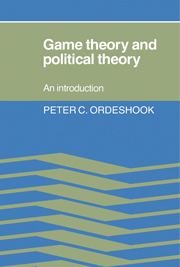Book contents
- Frontmatter
- Contents
- Preface
- Acknowledgments
- 1 Individual preference and individual choice
- 2 Individual preference and social choice
- 3 Basic theory of noncooperative games
- 4 Elections and two-person zero-sum games
- 5 Nonzero-sum games: political economy, public goods, and the prisoners' dilemma
- 6 Institutions, strategic voting, and agendas
- 7 Cooperative games and the characteristic function
- 8 The core
- 9 Solution theory
- 10 Repeated games and information: some research frontiers
- References and a guide to the literature
- Index
6 - Institutions, strategic voting, and agendas
Published online by Cambridge University Press: 21 March 2010
- Frontmatter
- Contents
- Preface
- Acknowledgments
- 1 Individual preference and individual choice
- 2 Individual preference and social choice
- 3 Basic theory of noncooperative games
- 4 Elections and two-person zero-sum games
- 5 Nonzero-sum games: political economy, public goods, and the prisoners' dilemma
- 6 Institutions, strategic voting, and agendas
- 7 Cooperative games and the characteristic function
- 8 The core
- 9 Solution theory
- 10 Repeated games and information: some research frontiers
- References and a guide to the literature
- Index
Summary
What differentiates political science from other social sciences is its concern with the actions and decisions that people take within specific institutions: elections, legislatures, the courts, regulatory agencies, and so forth. Because these institutions are human creations, they serve a purpose that reflects human design or evolutionary durability. Those purposes may involve inducing people to choose specific actions, or to lead people not to choose actions that might occur under alternative arrangements. Institutions tend to survive because they satisfy some prevailing objectives and they may evolve or disappear if their damage to human welfare becomes patent. Hence, to understand why one institution survives whereas another disappears, we must try to understand the outcomes that one institution produces but another does not.
Viewing institutions as explicit or implicit products of individual choice seems only logical. We learn why the Constitution establishes a bicameral legislature and an electoral college, for example, by knowing the outcomes that the Framers anticipated under different arrangements, the outcomes of conflicts between large and small states, and of election by an informed elite instead of a mass of uninformed voters. People sometimes forget this purposive view of institutions when they propose Utopian schemes for some international order without full consideration of the imperatives of national interests, or when they espouse the establishment of federal regulatory agencies to correct some market failure, without an analysis of the interests that those agencies might serve in the future.
To learn why people choose certain political institutions instead of others, and to understand how these institutions might affect people's actions, we must analyze how institutions affect choice.
- Type
- Chapter
- Information
- Game Theory and Political TheoryAn Introduction, pp. 243 - 301Publisher: Cambridge University PressPrint publication year: 1986



